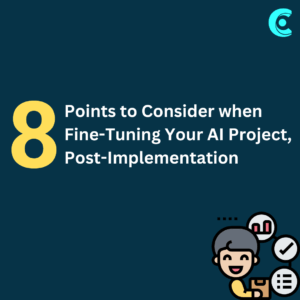8 Points to Consider when Fine-Tuning Your AI Project, Post-Implementation

1.Establish KPIs – The post-implementation refinement and adjustment focus on answering the questions “Is the AI working as intended” and “Is it adding value to the business.” A post-implementation analysis of the AI model that compares the results with the established set of qualitative and quantitative KPIs determines the success of the AI adoption. These KPIs can be the Number of Tasks Automated, Accuracy, Reduction in Man-hours, Customer Satisfaction, etc.
2.Measure Success: The problem is that organizations need more tools to assess their performance to start AI engagements. Determine the level of automation success and evaluate whether the implementation of the AI project has achieved its aims and stakeholder expectations. Use the metrics such as Reduction in errors, Cost & Time Saving, Enhanced Decision-Making, and User Engagement to gauge the adoption of AI.
3.Financial Impact: The economic impact may be the most crucial statistic for determining whether your AI engagement was successful. Financial KPIs take into account the investments and profits made by the organization. The output is assessed using KPIs like revenue growth, revenue per employee, revenue per account, gross profit, net product revenue, cost savings, and operational cash flow to ensure a net gain after integrating the AI interaction.
4.Customer Feedback: Getting customer feedback on the AI interventions is crucial. It is essential to monitor customer experience regularly to determine how the new AI technology is being received or how well it is being used.
5.Employee feedback: The AI engagement must provide a better employee experience and address issues with employees. A company’s growth depends on its personnel, who must learn new things constantly. Automating tedious and repetitive processes through AI integration should free up workers’ time to upgrade their skills. Evaluate the responses given by the employees to gauge the success of the AI project.
6.Compliance Evaluation: AI can be incredibly profitable, but it also has a lot of potential for error. If the training dataset is flawed, it might violate people’s privacy or give false results. To maintain fairness in the AI interaction, businesses implementing AI must check its adherence to ethics and sustainability.
7.Corrective Actions: The algorithms and models used by your AI system may lose their effectiveness and accuracy over time. The necessary corrective actions are implemented based on the degree of variation. The key lessons learned are documented for future projects. The post-implementation evaluation of the AI project is a critical aspect of the overall AI strategy.
8.Adapt – The business landscape changes over time; hence, it is paramount to monitor the implemented AI model and make modifications to keep it relevant and adapt to the changes.
Share your Thoughts!
